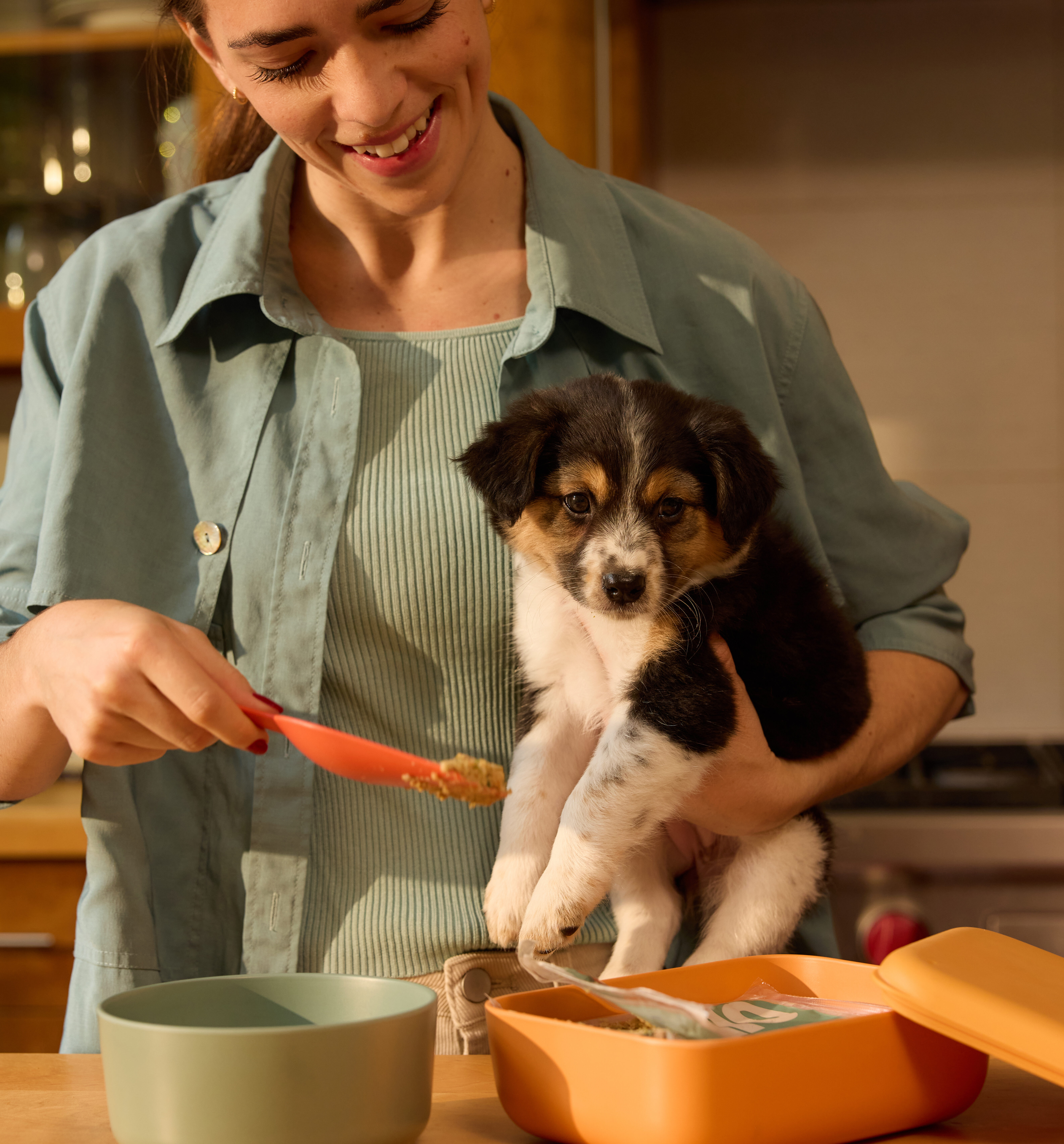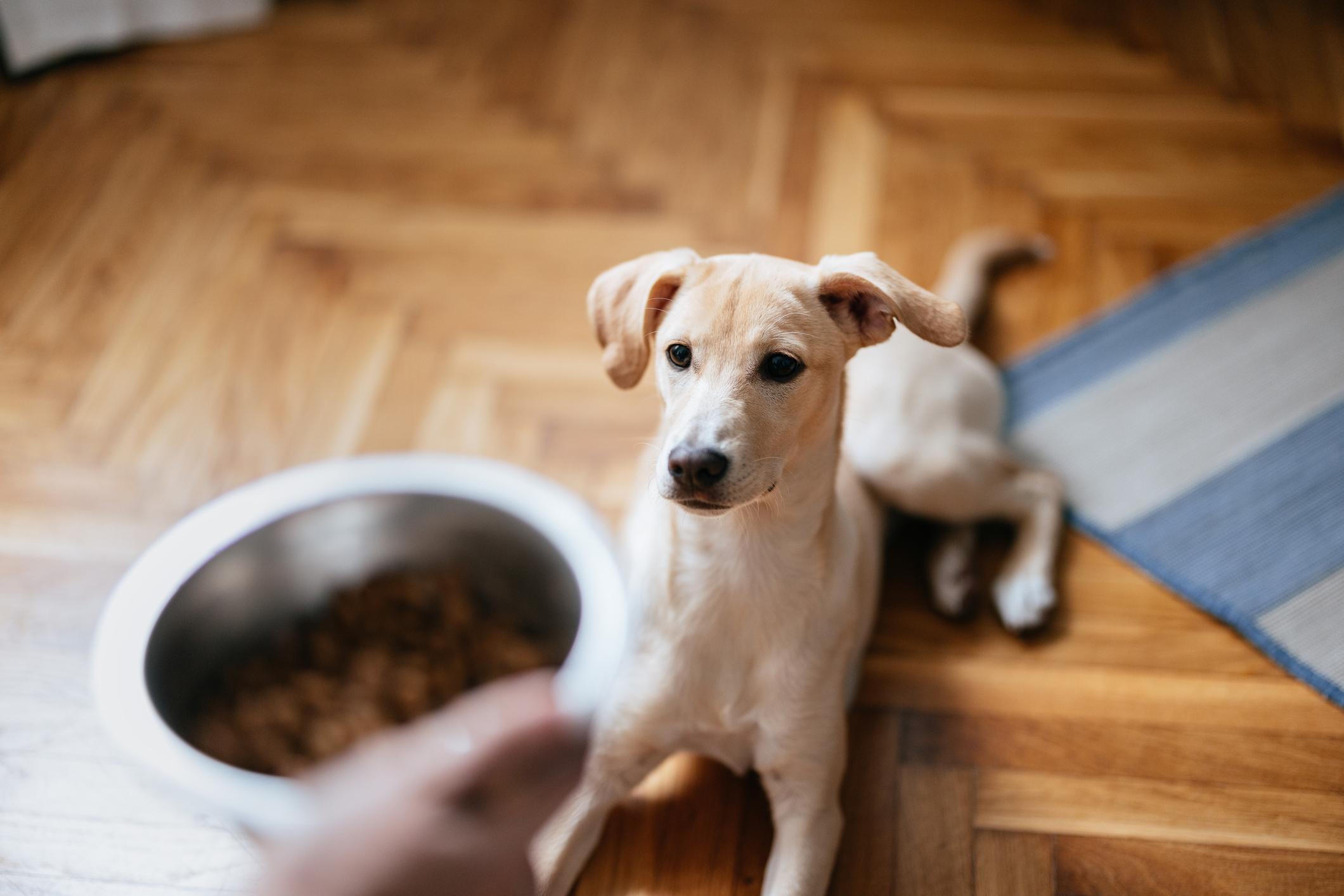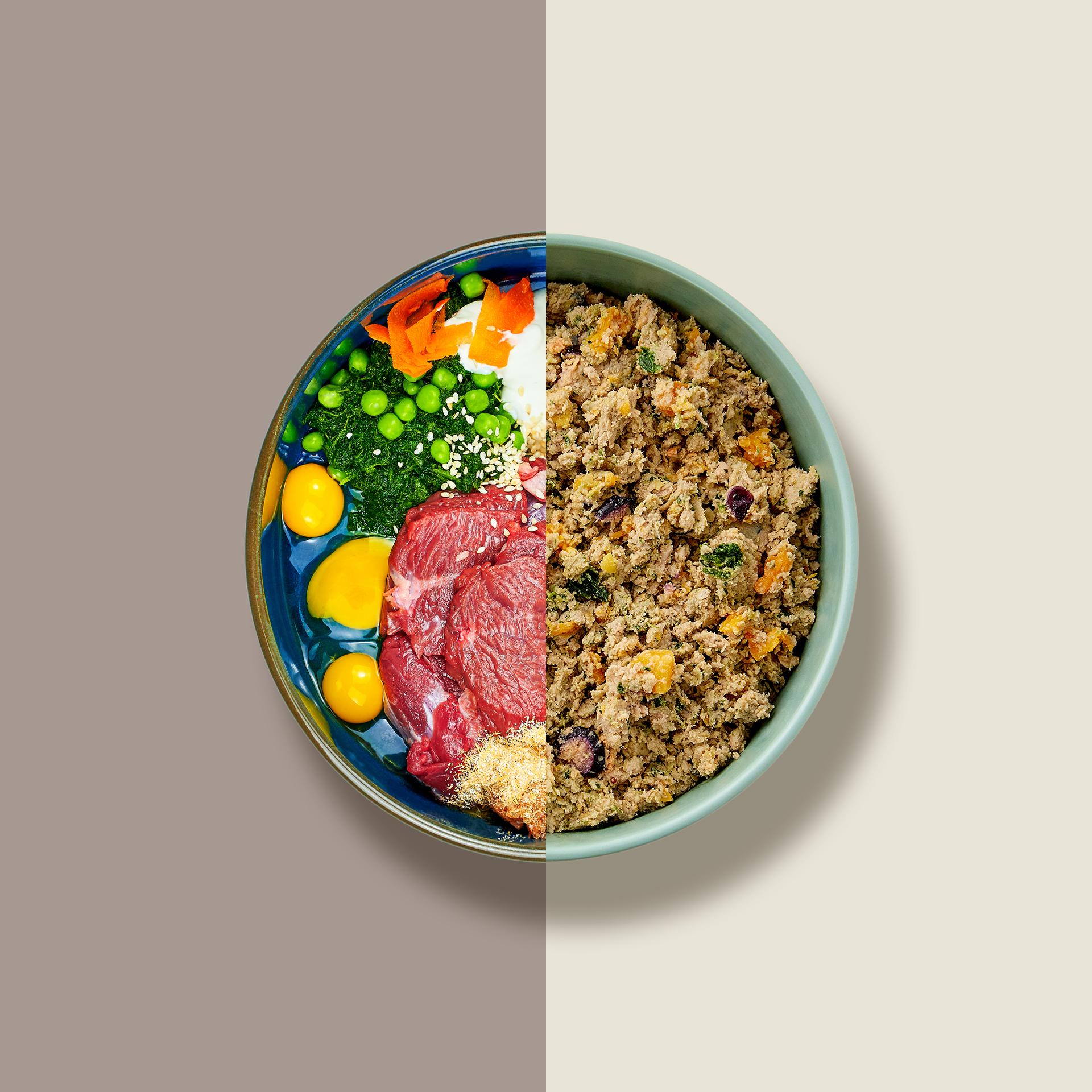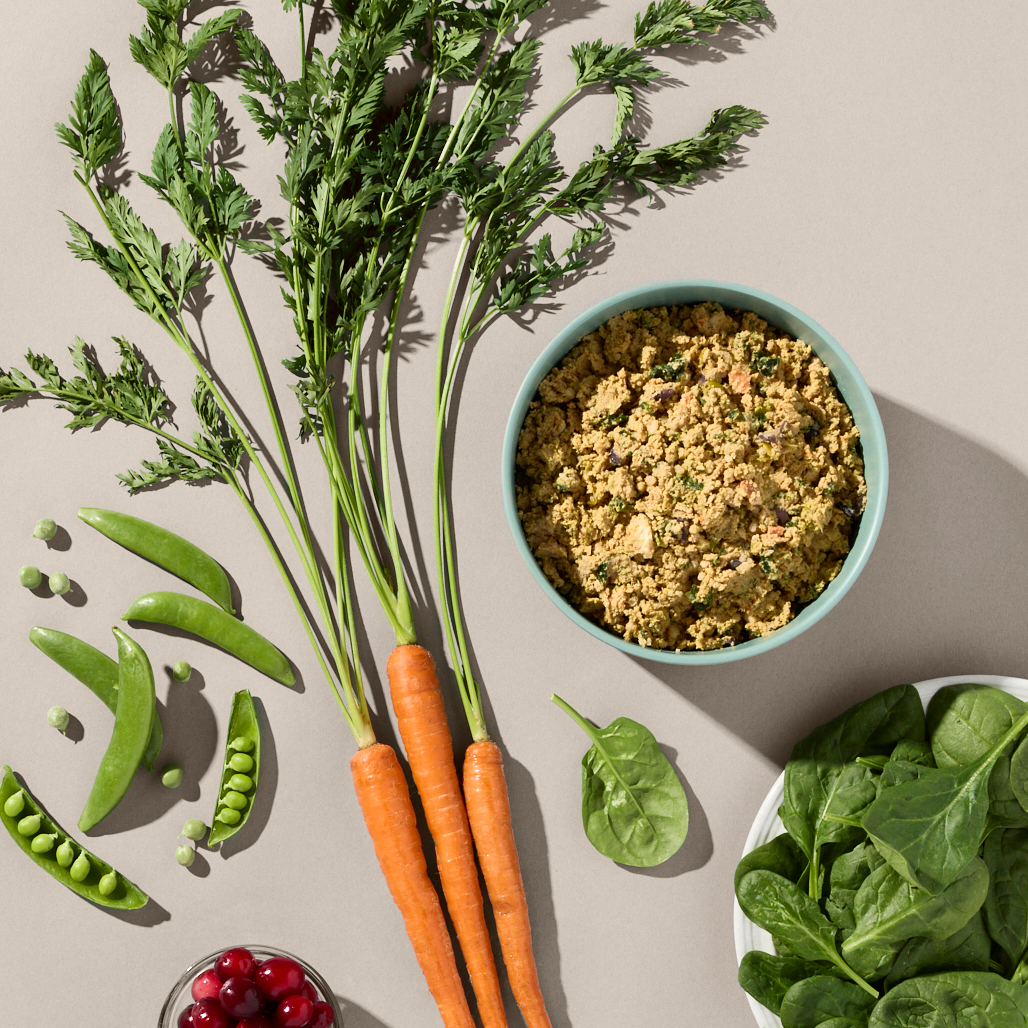Hey Ollie blog readers! We’re offering you an exclusive 60% OFF your starter box! Try now!
Proper nutrition during your puppy’s early months lays the foundation for their lifelong health and development. As your puppy grows, their nutritional needs will change along with them. Understanding these changes and providing the right food at the right time can make all the difference in their development.
Understanding Your Puppy’s Nutritional Needs
Puppies experience rapid growth during their first year of life. Their bodies are developing quickly, and their digestive and immune systems are still maturing. This means they have very different nutritional requirements than adult dogs.
The Critical First Months
During the first month of life, a puppy’s best source of nutrition is their mother’s milk, which provides the perfect balance of nutrients for a growing puppy[1]. If you’re raising puppies without the mother or need to supplement feeding, only use formula specifically made for puppies—never substitute with kitten or human formula[1].
As puppies transition to solid food, they need diets that support their developing bodies. Three key nutrients are particularly important during this growth phase:
- Protein: Essential for muscle development and overall growth
- Fat: Provides concentrated energy needed for development
- Calcium: Critical for proper bone formation and strength[2]
Growth Patterns and Nutritional Timing
Your puppy’s growth timeline depends largely on their size. Small breeds may reach adulthood by 8 months, while larger breeds might continue growing for up to 24 months[3]. This extended growth period means their nutritional needs will change over time, requiring adjustments to both the type and amount of food they receive.
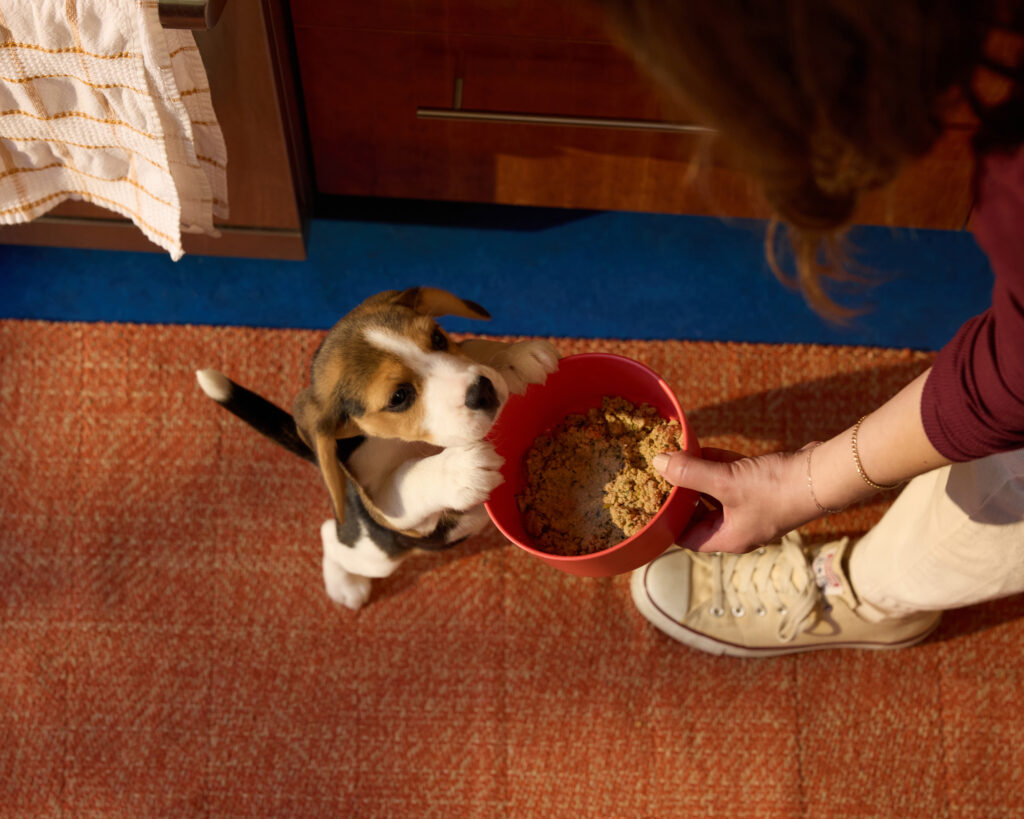
Creating the Perfect Puppy Feeding Schedule
A consistent feeding schedule helps establish healthy eating habits and supports proper digestion. Here’s a general timeline to follow:
6 Weeks to 12 Weeks
During this early stage, puppies benefit from frequent, smaller meals. Feed your puppy 3-4 times daily in small portions[4]. This helps maintain steady energy levels and supports their still-developing digestive system.
3 Months to 6 Months
As your puppy grows, you can begin to reduce feeding frequency. If they’ve been eating four times daily, consider cutting down to three meals per day while maintaining appropriate portion sizes[4].
6 Months to 12 Months
Around the six-month mark, most puppies can transition to twice-daily feeding. This is also when you can begin gradually transitioning from puppy food to adult food, depending on your dog’s breed and size[4].
1 Year and Beyond
By their first birthday, most dogs should be fully transitioned to an adult feeding schedule of two meals per day[4]. However, larger breeds that are still growing may need to remain on puppy food longer—consult with your veterinarian for personalized guidance.
Choosing the Right Food for Your Growing Puppy
With countless options available, selecting the right food for your puppy can feel overwhelming. Here’s what to consider when making this important decision:
Quality Ingredients Matter
Look for foods that list a high-quality protein source as the first ingredient. Whole meats, fruits, vegetables, and appropriate grains provide the balanced nutrition puppies need for optimal development.
Fresh food options, like those offered by Ollie, provide human-grade ingredients tailored to your puppy’s specific nutritional needs. These fresh alternatives eliminate many of the fillers and preservatives found in conventional puppy foods while delivering nutrients in a highly digestible form.
Understanding Food Types
- Dry Kibble: Traditional and convenient, quality kibble can provide complete nutrition for puppies. Look for options specifically formulated for puppies of your dog’s size category.
- Wet Food: Higher moisture content can help with hydration and may be more palatable for picky eaters. It’s often more expensive than kibble but can be mixed with dry food.
- Fresh Food: Minimally processed foods made with human-grade ingredients preserve more nutrients and can be especially beneficial for puppies with sensitive digestive systems or food sensitivities.
- Raw Diets: While some pet parents advocate for raw feeding, these diets require careful planning to ensure nutritional balance and safety, particularly for growing puppies.
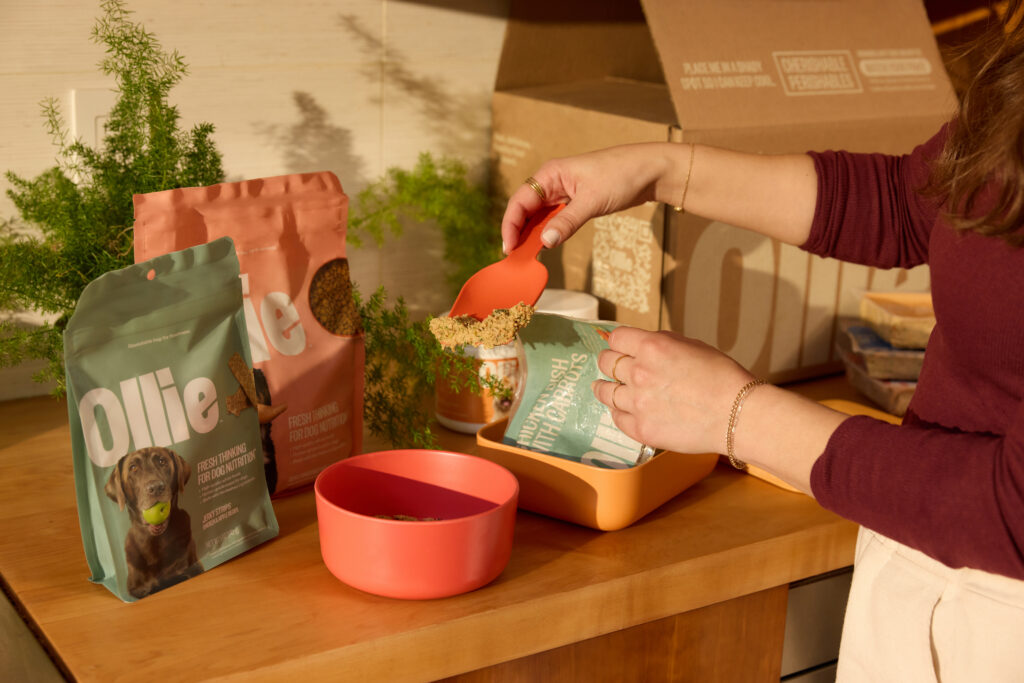
How Much Should You Feed Your Puppy?
Determining the right portion size is just as important as choosing the right food. Overfeeding can lead to obesity and related health issues, while underfeeding may result in nutritional deficiencies and stunted growth.
Factors That Influence Portion Size
Several factors determine how much your puppy should eat:
- Breed size (small, medium, large, or giant)
- Age and growth stage
- Activity level
- Metabolism
- Type of food being fed
Monitoring Growth and Adjusting Portions
Puppies should be weighed regularly to ensure they’re growing at an appropriate rate. After the first day, when weight may remain stable, puppies should show steady weight gain[1]. If your puppy loses weight or fails to gain weight, consult your veterinarian promptly.
Transitioning to Fresh Food: What Pet Parents Should Know
If you’re considering switching your puppy to fresh food, a gradual transition is essential to prevent digestive upset. Here’s how to make the switch successfully:
- Start by mixing a small amount of fresh food with your puppy’s current food
- Gradually increase the proportion of fresh food over 7-10 days
- Monitor your puppy for any signs of digestive issues during the transition
- Adjust the transition timeline as needed based on your puppy’s response
Fresh food services like Ollie make this process easier by providing personalized feeding plans based on your puppy’s specific needs, including age, weight, breed, and activity level. These customized portions take the guesswork out of feeding and ensure your puppy receives precisely the nutrition they need.
Common Puppy Feeding Challenges and Solutions
Even with the best planning, you may encounter some challenges when feeding your puppy. Here are solutions to common issues:
Picky Eating
If your puppy seems uninterested in their food:
- Ensure you’re feeding appropriate portions
- Maintain a consistent feeding schedule
- Avoid offering too many treats between meals
- Consider adding a small amount of warm water to enhance aroma
Rapid Eating
Some puppies eat too quickly, which can lead to digestive issues:
- Use slow-feeder bowls designed to pace eating
- Divide meals into smaller portions
- Feed in a quiet area away from other pets
Food Sensitivities
Signs of food sensitivities may include:
- Digestive upset
- Excessive itching
- Ear infections
- Poor coat quality
If you suspect your puppy has food sensitivities, consult with your veterinarian. They may recommend an elimination diet or suggest fresh food options with limited ingredients to identify and avoid problematic components.
Frequently Asked Questions
When should I switch my puppy from puppy food to adult food?
Most dogs can begin transitioning to adult food around 12 months of age. However, small breeds may transition earlier (around 9-10 months), while large and giant breeds may need to stay on puppy food longer (up to 18-24 months). Consult with your veterinarian for guidance specific to your puppy’s breed and growth pattern.
How can I tell if my puppy is getting proper nutrition?
A well-nourished puppy will have a healthy coat, appropriate energy levels, and steady weight gain. Your puppy should be neither too thin nor overweight. Regular veterinary check-ups can help ensure your puppy is growing appropriately and receiving adequate nutrition.
Is grain-free food better for puppies?
Not necessarily. Recent studies have raised concerns about grain-free diets and heart health in dogs. Unless your puppy has a specific grain allergy (which is rare), there’s no need to avoid grains. Many puppies benefit from the nutrients found in whole grains like brown rice and oats.
How often should I change my puppy’s water?
Fresh, clean water should be available to your puppy at all times. Change the water at least twice daily, and wash the bowl daily to prevent bacterial growth.
Can I feed my puppy human food?
While some human foods are safe for puppies in moderation, many are harmful or even toxic. Fresh, whole foods like plain cooked chicken, carrots, or blueberries can be occasional treats, but they should make up no more than 10% of your puppy’s diet. Always research before sharing human food with your puppy, and avoid foods known to be toxic to dogs, such as chocolate, grapes, and onions.
The nutrition you provide during your puppy’s first year sets the stage for a lifetime of health. By understanding your puppy’s unique nutritional needs and feeding them appropriately, you’re giving them the best possible start. Whether you choose premium kibble, wet food, or fresh options like those offered by Ollie, the most important factors are quality ingredients, appropriate portions, and consistency.
Remember that every puppy is unique, and what works for one may not work for another. Pay attention to your puppy’s response to their food, monitor their growth and energy levels, and don’t hesitate to consult with your veterinarian if you have concerns about their diet or development.
Citations
[1] https://www.chewy.com/education/dog/food-and-nutrition/puppy-feeding-guide
[2] https://vcahospitals.com/know-your-pet/feeding-growing-puppies
[3] https://www.royalcanin.com/us/dogs/puppy/puppy-feeding-and-nutrition
[4] https://www.thepuppyacademy.com/blog/2020/9/14/puppy-feeding-guide-for-new-owners
Tagged As:

The nutrition your dog needs,
the food they want.

Enjoying our articles? Subscribe our Newsletters and get new articles directly to your inbox
You might also like
12 August 2025
5 MINS READ
Top 8 Allergens Hiding in Your Dog’s Bowl
As pup parents, we never want to see our dogs uncomfortable. When it comes to itching, swelling, and upset stomachs, the culprit may be in their bowl. Understanding the most common allergens and t…
by Ollie Pets
12 August 2025
5 MINS READ
Raw vs. Gently Cooked: Which Is Ideal for Your Pup?
As more pup parents seek the best fresh dog food for their companions, they may find themselves choosing between a raw diet and a fresh diet. While cases have been made for both options, let’s exa…
by Ollie Pets
12 August 2025
5 MINS READ
Why Human-Grade Ingredients Matter for Your Dog
A healthier, happier dog starts with the right food. That said, knowing which diet is best for your pup can be overwhelming at times. Understanding what human-grade means, why it matters, and how …
by Ollie Pets
